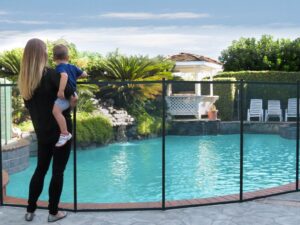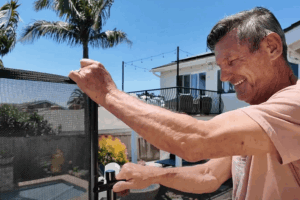
What Makes a Pool Fence Truly “Child-Safe”?
A truly child-safe pool fence does more than meet code. Discover the features parents should prioritize, and how All‑Safe builds fences that families trust.

When you’re creating a safer pool area that will be used by older adults, it helps to understand that senior pool safety comes with some unique concerns not often faced by younger adult or child swimmers. As our bodies age, they change, and those changes can affect both their physical and mental capacities to safely enjoy the pool. While sometimes hard to accept, embracing this new phase of life and ensuring you know how to use the pool safely for relaxation, exercise, or therapy means your loved one can still enjoy the backyard oasis they love so much. Senior swimming remains a healthy, low-impact way to make sure the elders in your life can thrive, not just survive.
As we age, it’s important to keep your body and mind active. That means getting exercise that moves your body, mental stimulation to stay sharp, and a positive outlook that keeps life full of…well, life. Swimming pools can be an important part of the process, providing a comfortable environment where seniors can gather with friends and family. With senior pool safety in mind, the pool can get your body moving, provide the opportunity to develop and maintain new skills, and interact with others to keep the mind clear.
While seniors can still enjoy the pool, the reality is they may not be able to enjoy it quite the same as they did when they were younger. This can be a difficult truth to face, especially for lifelong swimmers who want to maintain their formerly rigorous athletic abilities. Preparing the pool area for senior pool safety helps protect some more vulnerable friends and family members so they can continue to enjoy the pool for many years to come.
Safety barriers save lives. Thousands of people succumb to accidental drowning injuries annually, and a lack of adequate protective barriers is cited as a contributing cause in many of them. For seniors who need swimming supervision, pool safety barriers help prevent unsupervised access that can leave them in a dangerous situation without help. More active seniors can still benefit from safety barriers both when visited by grandkids or in case they experience an emergency themselves or with an aging partner.
Senior pool safety includes making sure senior swimmers don’t get too hot or too cold. From medical conditions to medications, there are many factors that can impair the body’s ability to maintain a safe core temperature. If the pool isn’t heated, care should be taken about using the pool when temperatures drop. Watch carefully for warning signs of distress, like shivering, difficulty breathing, or altered states of consciousness. Plan for time to get out of the pool and warm up periodically. If the temperatures are too hot, make sure that shade is available to get out of the sun, rest for a bit, and ensure that fatigue isn’t setting in.
Slips and falls are a big danger to seniors, who may have coordination and balance difficulties or whose bones may be weakening with age. Ensure your deck has an anti-slip coating or add anti-slip pads to prevent the area from becoming a slip-and-fall hazard. Ladder rungs and steps need special attention, as a slip or fall entering or exiting the pool can not only cause potential injuries but also increases the risk of accidental drowning.
Swimming alone increases your risk at any age, but with individuals who are already at risk, it can prove to be a fatal mistake. Senior swimming should always be done with the buddy system so there’s a second set of eyes to watch for dangers and signs of distress. If both seniors are still healthy and have been cleared by their physicians for physical activity, they can safely partner with each other. If one or both have impaired physical or cognitive abilities, there should be at least one capable swimmer to serve as a responsible party in the case of an emergency situation.
While the old adage says you can’t teach an old dog new tricks, you’re never too old to learn senior pool safety. Check with the American Red Cross for local swimming class providers that can help teach or improve swimming skills for the elderly. Classes that focus on water safety for seniors are also commonly available. Even if the senior in your life doesn’t want to get training, you can make sure you’re ready in the event of an emergency by learning CPR, first aid, or water safety and rescue techniques.
When you want to make senior pool safety a priority, your local All-Safe Pool installer is ready to help. They’ll set a time to take measurements, talk to you about the needs of your senior swimmers, and give you a written estimate that lays out how cost-effective peace of mind can be. Protect your pool and your loved ones. Request your no-cost, no-obligation quote from your independent All-Safe Pool installer today.

A truly child-safe pool fence does more than meet code. Discover the features parents should prioritize, and how All‑Safe builds fences that families trust.

Thinking of installing your own pool fence? Discover the benefits of DIY kits, from cost savings and flexibility to safety compliance, and how All‑Safe makes it possible.

Just got a pool? Learn what every new owner should know, from safety codes and barrier options to basic upkeep and seasonal preparation.
Enter your zip code to locate an independent installer in your area
Enter your zip code to locate an independent installer in your area
Their contact info will be shown on the next screen.
Due to the many variations in monitors, phones, and browsers, color samples and product examples may appear different on different screens. Computers and mobile devices are not all calibrated equally and color reproduction on the Internet is not precise. The same is true for printed items such as brochures and other sales literature.
In addition, the colors of our products photograph differently under different lighting conditions. For example, photos taken in full sunlight will vary from photos taken on a cloudy or overcast day. Similarly, shadows from nearby objects can affect the color and transparency of our products. If a precise color or specific shade is important, please inspect the actual color of your product prior to installation.
Many of our products’ materials are not available through typical stores and vendors and therefore must be custom manufactured specifically for our use. In order to control costs and provide you with the best value possible, our raw materials are produced in large batches and can often take several months to receive. The colors of our materials can, and often do, vary slightly from batch to batch. Although we make every effort to minimize color variations, we cannot be responsible for these differences when they occur. If a precise color or specific shade is important, please inspect the actual color of your product prior to installation.
For example, we use the name “putty” to describe some of our products. Your idea of the color “putty” may be different than someone else’s idea of “putty”. In addition, products may have the same color name but may not be the exact same color. For example, we have different shades of “black”. Please do not order using color names as your only guide. If a precise color or specific shade is important, please inspect the actual color of your product prior to installation.
If it is important that your product be an exact color or shade, it is highly recommended that you inspect the actual product prior to its installation and address any concerns with your local independent installer. Most independent installers do not offer refunds or accept returns due to color variations.